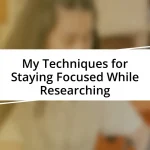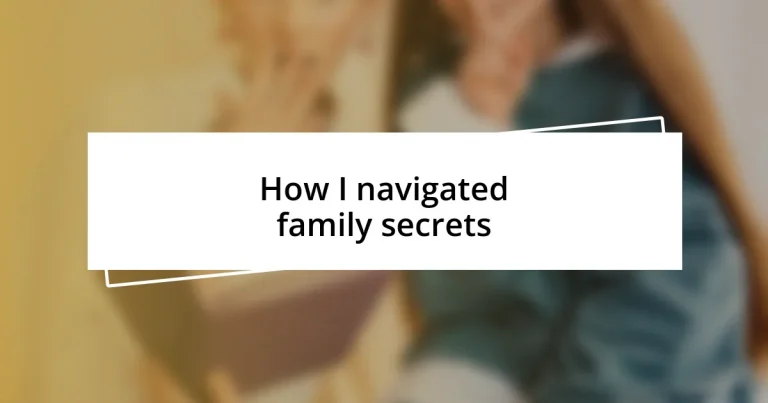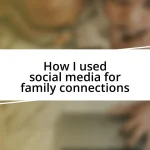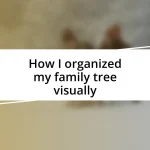Key takeaways:
- Family secrets can shape our understanding and perception of loved ones, revealing deeper layers and emotional connections.
- Recognizing signs of family secrets, such as evasive behavior and incomplete stories, can help uncover underlying issues.
- Confronting family members about secrets with vulnerability fosters understanding and connection rather than defensiveness.
- Transparency is essential for healing and building trust, paving the way for deeper, more authentic relationships.
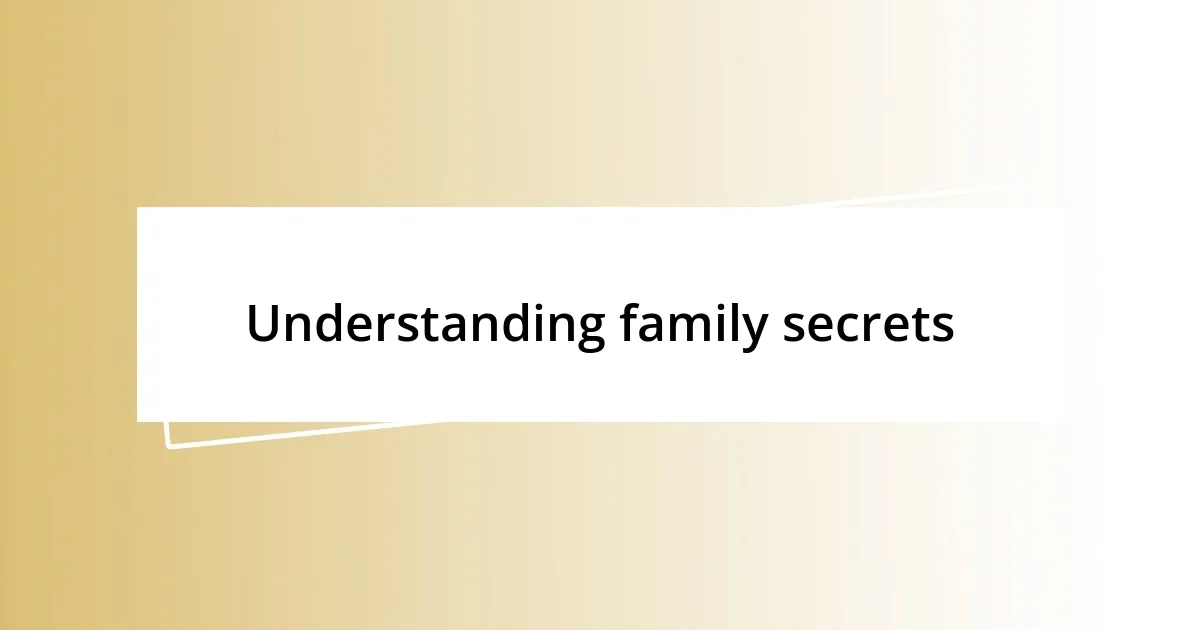
Understanding family secrets
Family secrets often create a complex web of emotions that can either bind us together or pull us apart. I remember discovering a hidden family photo that incited a flurry of unspoken questions within me. Why did we never talk about this person? The silence spoke volumes and left an emotional weight that lingered long after the initial shock.
In my experience, these secrets can sometimes keep us from seeing our loved ones as fully realized individuals. For instance, learning about my grandmother’s past during a casual conversation made me see her not just as a stern matriarch, but as a young woman with dreams and struggles. How often do we overlook the layers of our family members, stuck in the roles we’ve assigned them?
Unraveling family secrets can be both exhilarating and terrifying, stirring up long-buried feelings. I realized this when I confronted a family secret during a reunion; it led to an honest exchange that brought tears, laughter, and ultimately, a stronger bond. Isn’t it strange how a simple truth can transform our understanding of who we are?
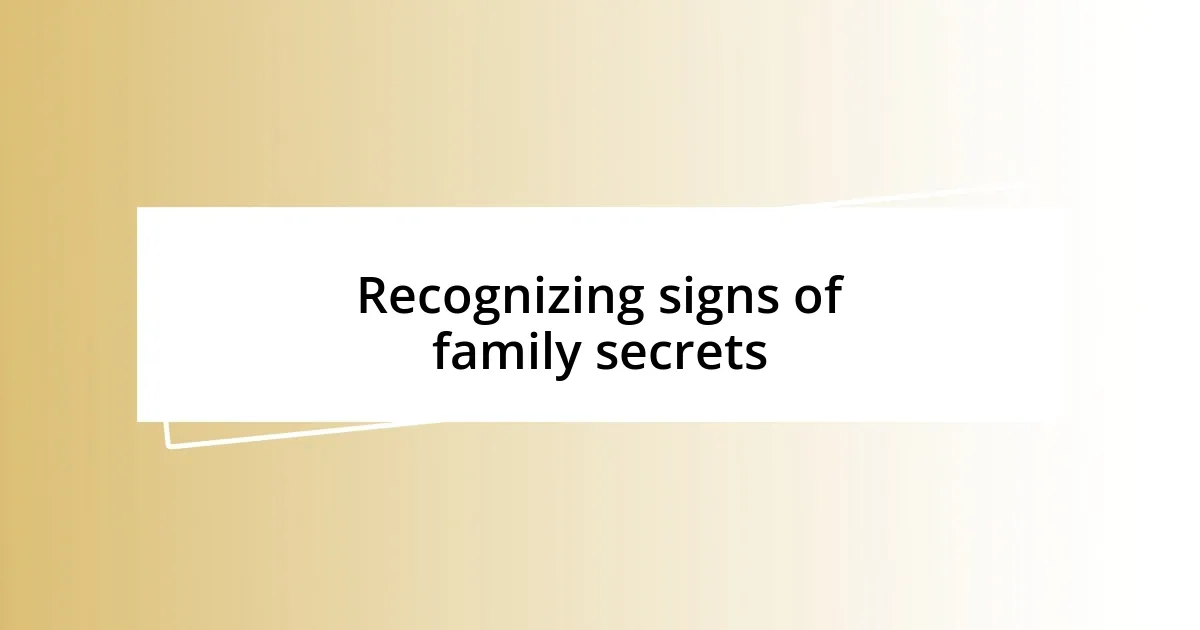
Recognizing signs of family secrets
When it comes to recognizing signs of family secrets, I’ve found that subtle cues often point to deeper truths. For instance, have you ever noticed how certain topics make family members unusually quiet? I recall a family gathering where everyone suddenly changed the subject when someone mentioned an old family friend. The shift in energy was almost palpable, leaving me curious about what was left unsaid.
Here are some signs that may indicate a family secret:
- Evasive behavior: Family members may dodge questions or change the topic when specific subjects arise.
- Tension: A noticeable discomfort or tension during discussions can hint at buried issues.
- Over-exaggerated reactions: Sometimes, an individual’s strong emotional response to a seemingly innocuous remark can reveal underlying secrets.
- Incomplete stories: When recounting family history, gaps in narratives or inconsistencies may suggest that key details are being withheld.
- Isolation of topics: Some family members may seem excluded from certain conversations, indicating a divide related to unshared truths.
Being attuned to these signs can lead us to the heart of family dynamics and, ultimately, the secrets that shape our identities. It’s as if each clue opens a door to a hidden room filled with untold stories waiting to be explored.
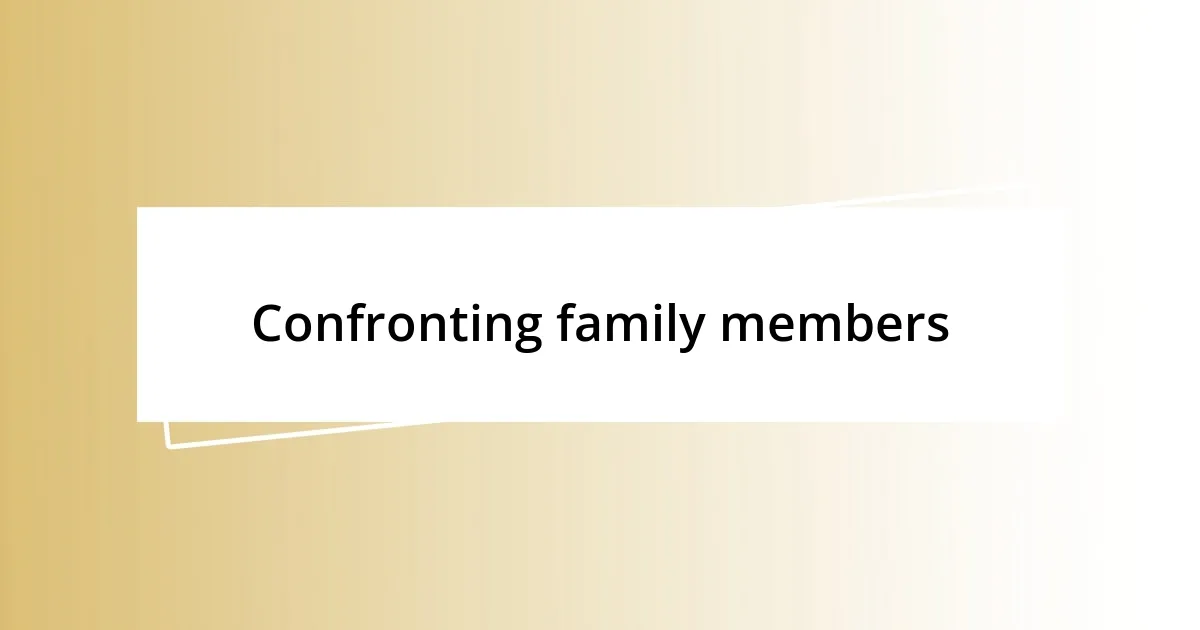
Confronting family members
Confronting family members about secrets is never easy. I remember the palpable tension as I gathered my courage one evening after dinner, pondering whether to bring up a hidden truth about my father’s childhood. It felt like walking into a minefield, each step heavy with the potential for emotional fallout. But, sometimes, avoiding the issue can leave a legacy of unresolved feelings, thickening the air with unspoken words.
During that tense conversation, I learned the power of vulnerability. When I framed my concerns with genuine curiosity rather than accusation, I noticed my father’s walls begin to lower. He started to share not just facts, but the emotions tied to those experiences, allowing me to see the person behind the role of ‘dad.’ The tears we shared created an unexpected intimacy, reshaping my understanding of him as a man with dreams and scars instead of just my parent.
In another instance, I confronted a family member who was perpetuating a family narrative that felt off to me. Using “I” statements like “I feel confused when I hear…” proved crucial in keeping the dialogue open and non-confrontational. It reminded me that the goal wasn’t just to uncover secrets but to foster understanding and connection. What I found intriguing was how admitting my own vulnerabilities prompted them to reflect on their truths, gradually peeling away layers like an onion.
| Approach | Outcome |
|---|---|
| Vulnerable Discovery | Creates deeper emotional connections and understanding. |
| Accusatory Confrontation | Often leads to defensiveness and further estrangement. |
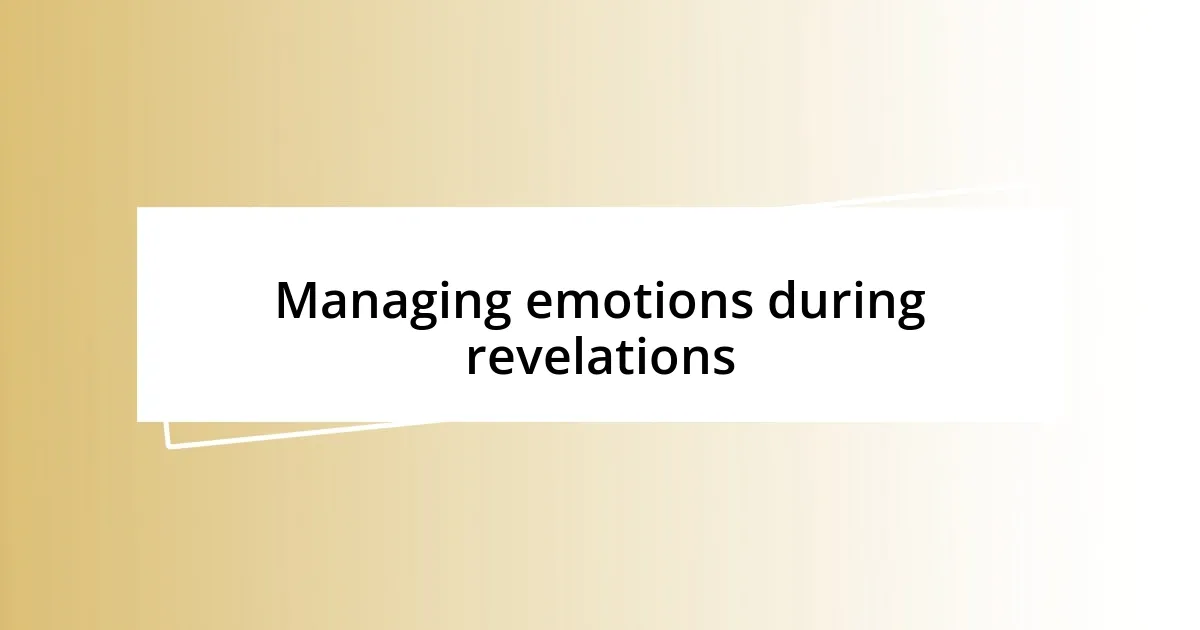
Managing emotions during revelations
Managing emotions during family revelations can be a delicate dance. I’ll never forget the moment I uncovered a long-buried family secret. The mix of shock and betrayal felt like a tidal wave crashing over me. How can something buried for so long feel so alive? I learned that emotions can swing wildly—one moment, I was angry, and the next, I felt profound sadness for the years lost in silence.
I’ve found that naming my emotions helped me navigate through the chaos. When I felt overwhelmed, I would take a pause, breathe deeply, and think about what I truly felt—was it grief for the connections lost, or fear of change? Sharing these feelings with trusted friends offered an outlet, turning my internal struggle into a dialogue. Have you ever tried putting pen to paper during an emotional storm? Writing it down transformed my confusion into a clearer narrative, allowing me to process each revelation more effectively.
It’s also essential to give yourself grace during these times. I once attended a family event shortly after a major revelation, and let me tell you, the tension was thick. Instead of pretending everything was fine, I allowed myself to appear a bit vulnerable, which surprisingly invited others to share their feelings too. That openness fostered unexpected conversations, proving that managing our emotions isn’t about suppressing them—it’s about creating space for honest dialogue. Have you ever experienced a moment where your vulnerability led to deeper connections? That was my reality, and it reshaped how I view family dynamics forever.
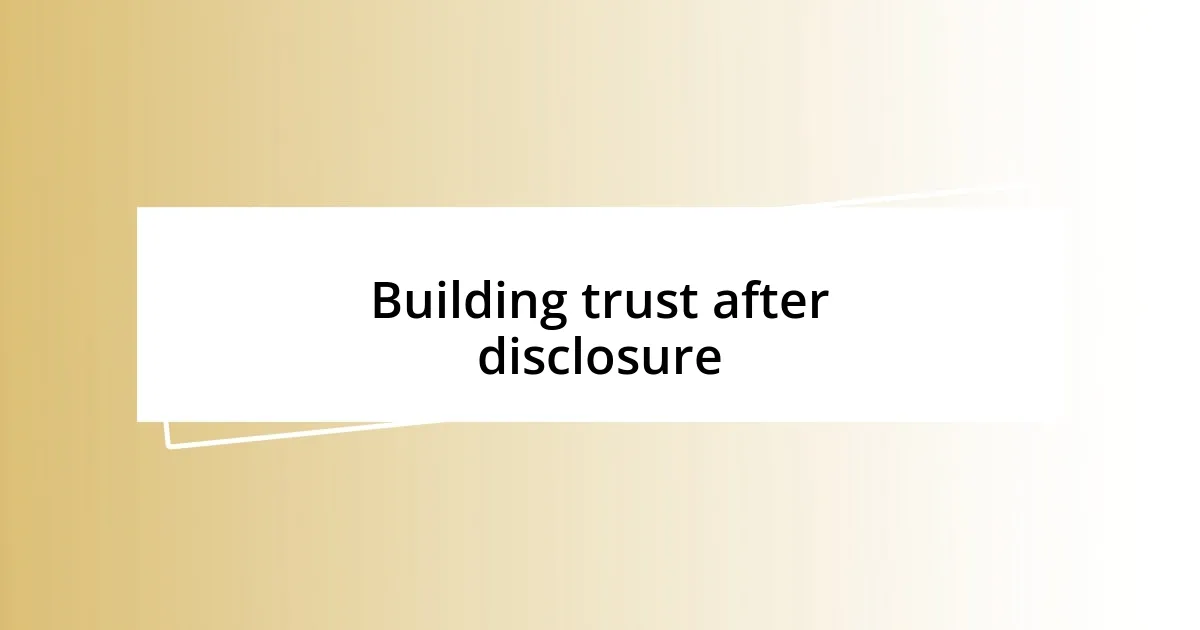
Building trust after disclosure
Building trust after unveiling family secrets is a nuanced journey. When I chose to share my own vulnerabilities, I realized how disarming honesty can be. During a particularly difficult family gathering, I decided to express how the revelation altered my perception of our dynamics. To my surprise, instead of defensiveness, I encountered relief—it seemed they were waiting for an invitation to share their own feelings of confusion. Have you ever felt that moment where vulnerability opens a door you didn’t even know existed?
As trust began to rebuild, I noticed how little gestures made a significant impact. A simple “thank you for listening” after a heartfelt conversation reinforced that the discourse was valued. I recall one evening when my sister reached out with a text that simply said, “I’m here if you want to talk.” That small act turned out to be monumental; it showed a commitment to being present, no matter how painful the topics might be. Trust isn’t just about sharing secrets; it’s about creating ongoing conversations that affirm our connection.
It’s also crucial to maintain patience while navigating this new territory. In one instance, I tried to rush the process, expecting immediate changes in our relationships. My eagerness only led to temporary misunderstandings and setbacks. I learned that rebuilding trust is like tending to a garden—sometimes, you need to let things grow at their own pace. Have you experienced the challenge of balancing your desire for resolution with the acknowledgment that growth takes time? It’s a delicate dance, but the rewards of deeper, more authentic relationships make the effort worthwhile.
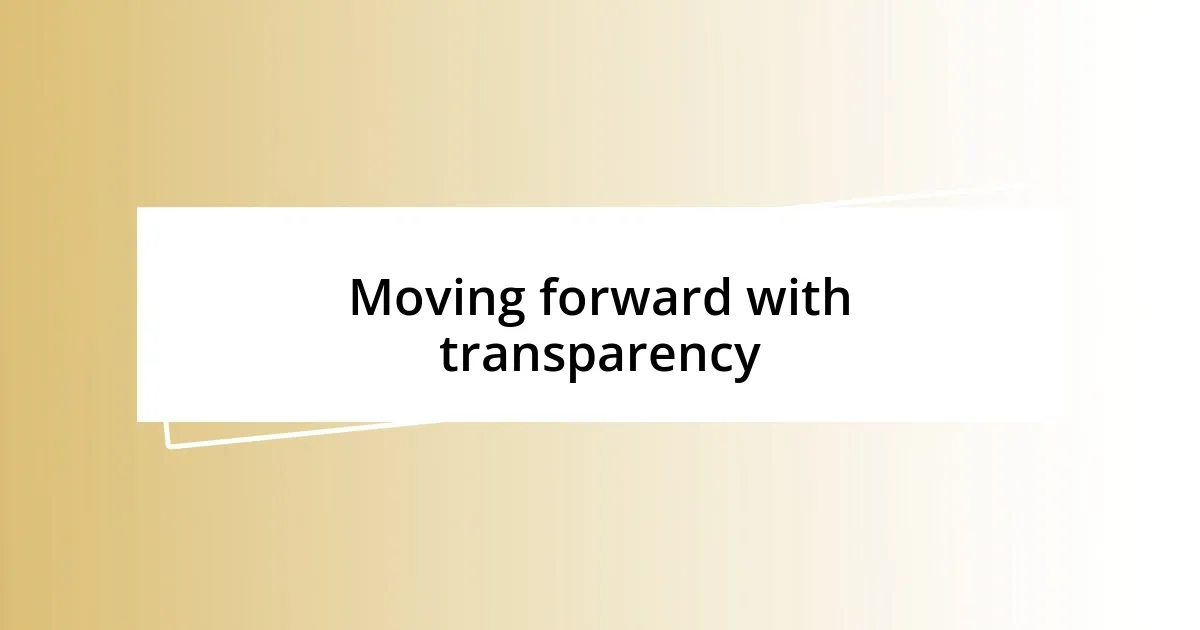
Moving forward with transparency
Moving forward with transparency requires courage, but I’ve found it to be transformative. After things settled from the initial emotional storm, I realized that open communication was essential for healing. I remember a heartfelt dinner where we decided to lay everything out on the table—every uncomfortable and unspoken feeling. Have you ever seen a family dynamic shift in the span of one honest evening? For us, it was like turning on a light in a dark room; suddenly, we could see each other clearly and understand the stories that shaped us.
As we embraced transparency, I saw relationships deepen in unexpected ways. A few weeks after that dinner, I received a voicemail from my brother, who shared his own hidden struggles. Hearing him speak so openly encouraged me to reciprocate, and it created an even stronger bond between us. This dance of sharing reminded me that vulnerability isn’t a weakness; rather, it’s an avenue for connection. Has there been a moment when being open about your struggles led to bond-building? For me, it was a revelation that clear dialogue paves the way for lasting trust.
Yet, moving forward with transparency can sometimes feel daunting. I vividly remember one instance when I hesitated to bring up a difficult subject during a family gathering. My heart raced, and I questioned whether it was worth rocking the boat again. But then I recalled how much better we felt after that initial honesty, and I decided to push through my discomfort. To my surprise, the conversation led to collective healing. It reminded me that sometimes the toughest conversations can be the most liberating. Have you ever faced that same hesitation, only to find clarity on the other side? In sharing my journey, I’ve realized that transparency fosters resilience and opens pathways toward deeper understanding.









